'The president has a girlfriend': Linda Tripp's betrayal of Monica Lewinsky and the taped phone calls
The phone calls eventually helped lead to the impeachment of President Clinton.
It was 1996 and Linda Tripp was on the phone once again with Monica Lewinsky, listening to her 23-year-old Pentagon colleague pour her heart out about the married man she'd fallen in love with but couldn't have.
Lewinsky's problems were not that simple, though.
The object of her affection was Bill Clinton, the president of the United States. And, although Lewinsky had no clue about it at the time, Tripp, more than 20 years her senior, was recording their very private phone conversations in an attempt to bring down the commander in chief.
"I need your help with punctuation on this," Lewinsky said to Tripp during one of their calls as she tried to craft a love note to Clinton.
"OK," Tripp said.
"'Handsome, you have been distant the past few months and have shut me out. I don't know why. Is it that you don't like me anymore, or are you scared? Please let me come see you this evening or Thursday night,'" Lewinsky said. "What if he doesn't see me like that?"
"He'll see you, or he'll call," Tripp said.
"Linda, if I ever wanna have an affair with a married man again, especially the president, please shoot me," Lewinsky said.
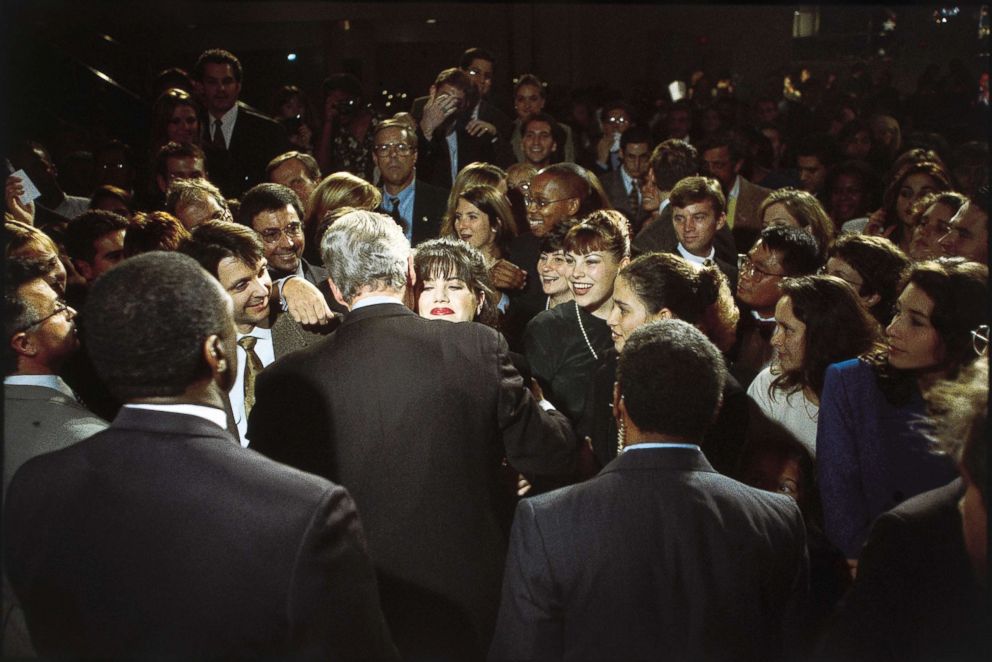
Monica Lewinsky meets the president
On the night of Nov. 15, 1995, during a government shutdown that drastically reduced staffing at the White House, Lewinsky found herself delivering a slice of pizza to the Oval Office.
In a flirtatious moment, she revealed the top of her thong underwear to the president as she walked away. Later, he summoned her back to the Oval Office for the first of many sexual encounters that would occur over the course of several months.
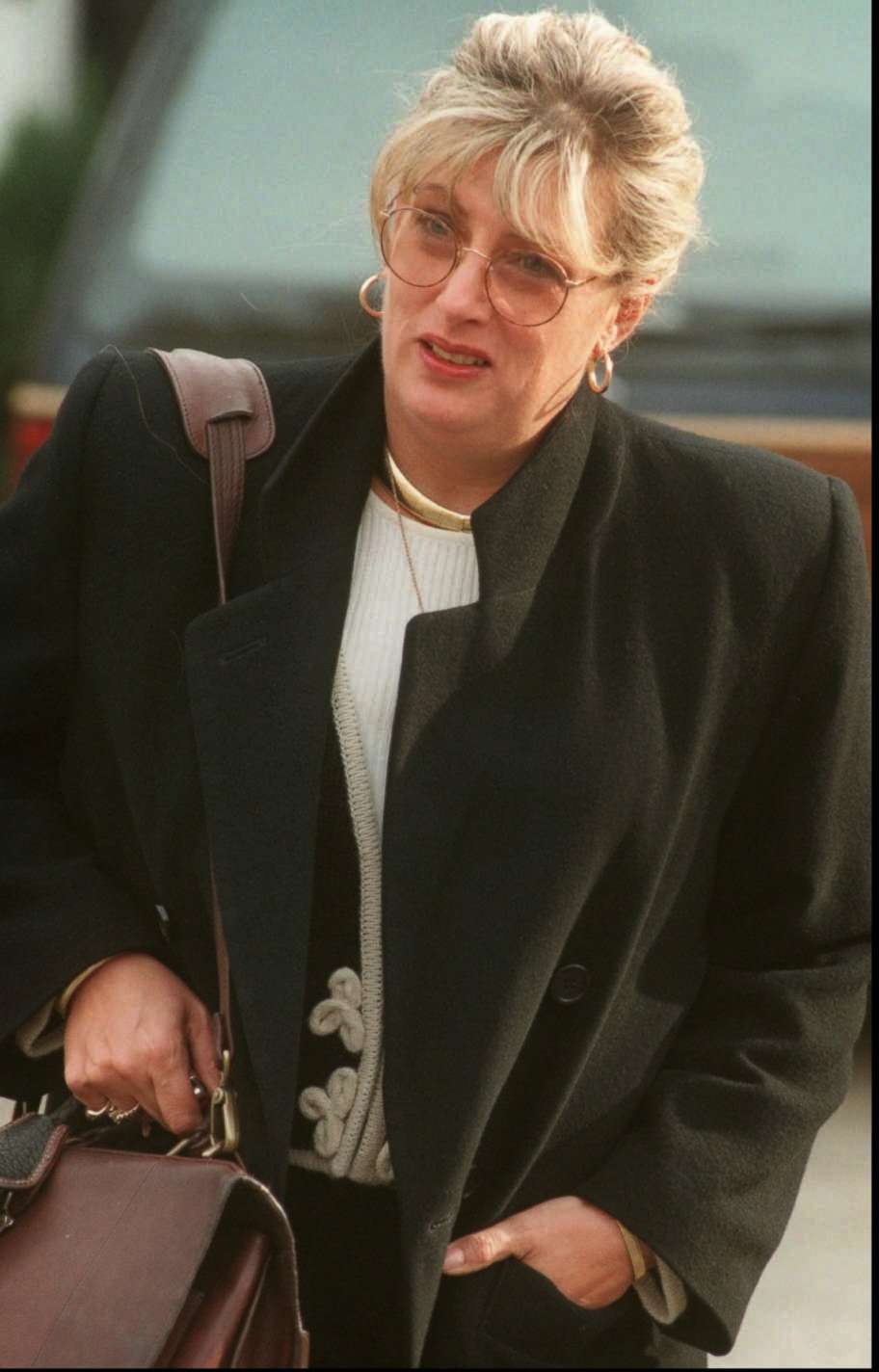
The two would eventually begin exchanging gifts and engaging in phone sex.
LEWINSKY: "It scares me to think about how much I care about him and how comfortable I am with him."
TRIPP: "I know."
LEWINSKY: "I just feel complete when I'm with him."
The White House tries to quash rumors
By April 1996, Clinton was up for re-election. Rumors of his questionable relationship with Lewinsky, then a White House intern working in the office of chief of staff Leon Panetta, stoked fears among the president's staff that it might jeopardize his campaign.
So Lewinsky was soon reassigned to the Pentagon, where she met and befriended Tripp, who had also previously worked in the Clinton White House.
The two grew close and eventually Lewinsky began sharing details of her sexual dalliances with the president with her new friend.
In a 2001 interview with Nancy Collins of ABC News, Tripp said: "I was fascinated. I couldn’t believe -- could he be that reckless? Could he be that arrogantly reckless to philander with a child? I was reeling from the horror of it all."
LEWINSKY: "Well, I saw him for 60 seconds."
TRIPP: "What? What?"
LEWINSKY: "Oh my God, Linda. He looked so gorgeous."
Lewinsky often recounted her exchanges with the president, including their late-night phone conversations. In the 2001 ABC News interview, Tripp admitted that she found Lewinsky “immature” and “a groupie,” but, she said she was also more than happy to listen to her.
LEWINSKY: "I… Listen, you’ll get mad at me. You know what I said at the end?"
TRIPP: "What?"
LEWINSKY: "The worst I could say."
LEWINSKY: "We were getting off and I’m like, 'All right. I love you, butthead.'"
TRIPP: "No."
LEWINSKY: "Called him butthead."
TRIPP: "You didn't."
LEWINSKY: "I did."
TRIPP: "And what’d he say?"
LEWINSKY: "Said, that was it, he just kind of hung up. Or I hung up. I was like, 'Oh my God. What the hell just came out of my mouth?'"
TRIPP: "Butthead."
LEWINSKY: "Butthead."
Tripp shares the Clinton-Lewinsky story
Tripp had worked in the White House under President George H.W. Bush, and was at first kept on board when the Clintons came to Washington. Since she was a child, she said, she'd wanted a job in the White House.
"The White House was the dream," Tripp said in a 2001 interview with ABC News. "I would have cleaned toilets with my tongue to work at the White House."
Tripp had considered writing a book about her time in the White House and got in touch with politically-conservative literary agent Lucianne Goldberg.
After the two women spoke several times, Goldberg's interest was piqued when she learned the president had been involved with an intern.
"'He has a girlfriend,' [Tripp said.] And I said, 'He, who?' She said, 'The president has a girlfriend,'" Goldberg told ABC News recently.
TRIPP: "I wanted to chat with you about something that is just completely ridiculous."
GOLDBERG: "Yeah, but you realize the press will destroy her."
TRIPP: "You really think that they could destroy her?"
GOLDBERG: "Well, but no, the publicity might destroy her. I mean, I love the idea. I would run with it in a second, but do you want to be the instrument of this kid, really?"
GOLDBERG: "If you’re ready to go ahead with this, you have to be ready to lose her as a friend."
TRIPP: "Oh, I have already made that decision."
Goldberg encouraged Tripp to surreptitiously record her calls with Lewinsky in order to gather proof of the clandestine relationship. It was on Oct. 3, 1997 that Tripp recorded the first in a series of many calls with Lewinsky, in which they discussed everything from their workout and dieting schedules to the details of Lewinsky’s intimate relationship with Clinton.
Meanwhile, investigative journalist Michael Isikoff was looking into allegations of improper behavior toward women by Clinton when he learned that Tripp might have some relevant information.
When he tracked down Tripp at the Pentagon, she told him about a young woman who had been a White House intern and who was having a relationship with Clinton.
Tripp also relayed this information to lawyers for Paula Corbin Jones, who had filed a civil lawsuit against Clinton, alleging sexual harassment and civil rights violations while he was governor of Arkansas. Clinton denied the allegations.
Lewinsky, of course, was unaware that Tripp had betrayed her confidence.
LEWINSKY: "Nobody saw anything, so nobody can know."
TRIPP: "Monica. ... Someone has told them something."
"The public really did need to know how reckless this president is," Tripp said years later in an interview with ABC News.
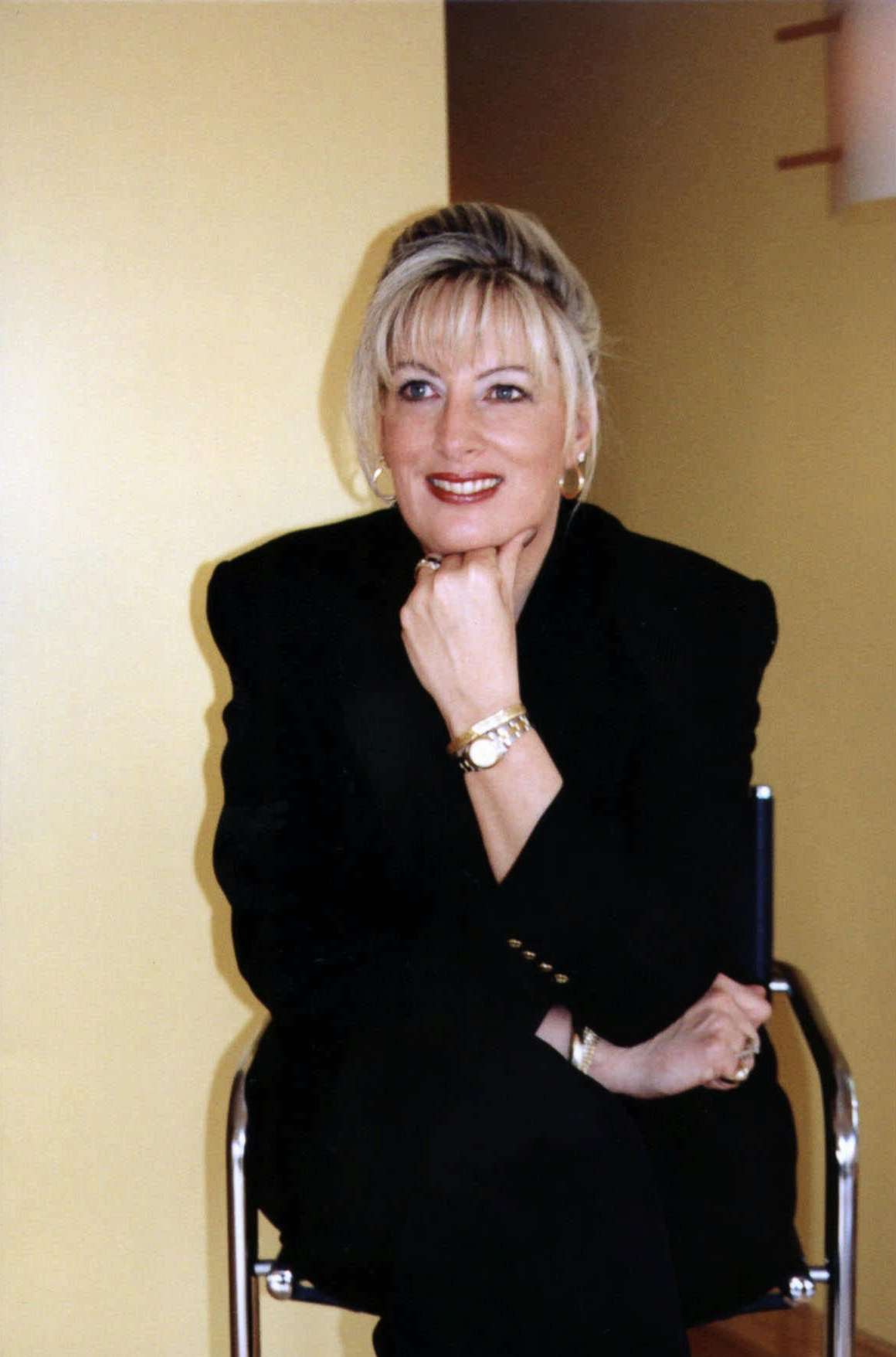
Emotional roller coaster
In calls with Tripp, Lewinsky recounted the disappointment that came with her April 1996 reassignment, as well as the president's promise that came with it.
TRIPP: "You mean, he's the one who told you you had to leave."
LEWINSKY: "No. He said, he says, 'Why do they have to take you away from me? I trust you so much.'"
LEWINSKY: "He said, 'I promise you.' You know, something like, 'If I win in November, I'll have you back like that.'"
LEWINSKY: "You could do anything you want. You, you could be anything you want. And then I made a joke and I said, 'Well, can I be assistant to the president for b--- jobs?'"
TRIPP: "You didn’t say that."
LEWINSKY: "I did."
TRIPP: "Oh, Monica, Monica, Monica."
But as time passed, it became apparent that she would not be returning to the White House. There were also times when there was no contact between Lewinsky and the president for weeks.
LEWINSKY: “It’s so hard.”
TRIPP: “I know. But, if it’s any consolation.”
LEWINSKY: “You have no idea how hurt I am that I’m not going back.”
TRIPP: “I know. It’s the worst.”
LEWINSKY: “Why can’t he just be nice and make my life wonderful?”
TRIPP: “In his own way, he’s trying to be nice, I think.”
LEWINSKY: “Yeah, by not calling me for six and a half weeks. That’s nice?”
As the separation went on and Lewinsky struggled to understand the relationship, she became increasingly distraught, turning again and again to her trusted confidante.
LEWINSKY: “I was upset. I’m just not like me. ... I can’t take it anymore.”
TRIPP: “I know. I know.”
LEWINSKY: “I just can’t.”
TRIPP: “Oh, my God.”
LEWINSKY: “I just, it’s too, it’s too much for one person.”
“No one cared about her. The suicide threats. Her life was meaningless. So, yeah. Something kicked in. Was it maternal? I don’t want to define it that way. I will only say that I began to resent the president once I knew about this enormously,” Tripp said.
Then, in December 1997, Lewinsky was hit with a subpoena in the Jones case but denied the relationship in a written affidavit in an effort to protect the president.
LEWINSKY: "To tell you the truth, I’m not concerned all that much anymore because I’m not gonna get in trouble. I will not get in trouble because, you know what? The story I’ve signed under oath is what someone else is saying under oath.”
TRIPP: “Who?”
LEWINSKY: “He will.”
TRIPP: “Oh, the big guy?”
Lewinsky’s attention turned to her desire for a new job -- something that could take her away from her Washington nightmare. Aware of this, Clinton enlisted the help of his close friend Vernon Jordan, one of the most powerful lawyers in Washington.
TRIPP: “The other thing is, you know, we haven’t gotten to that point yet, but are you expected to interview for these jobs?”
LEWINSKY: “No, I hadn’t thought about that.”
TRIPP: “I mean, when, my understanding with this is he is going to secure you a job.”
LEWINSKY: “Mmmhmmm.”
TRIPP: “Sort of like, somebody’s gonna tell somebody, and you’re gonna be told when to show up.”
LEWINSKY: “Yeah, that’s what I’d like. You know.”
In January 1998, she was offered a job at Revlon in New York, thanks to Jordan's referral.
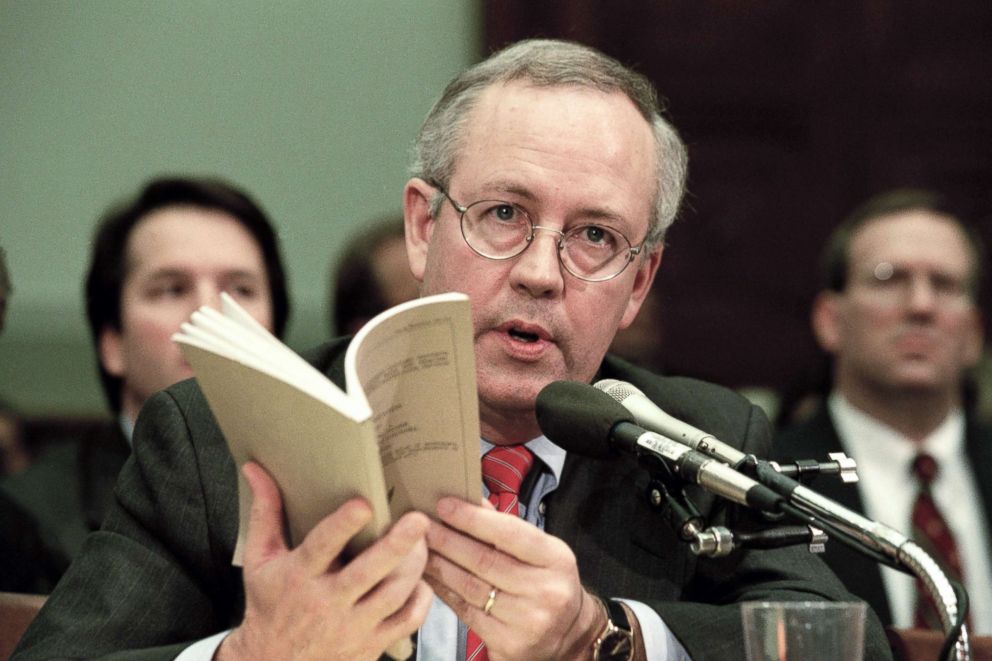
LEWINSKY: "I’ll tell you what concerns me, Linda, somebody could construe or say, 'Well, they gave her a job to shut her up. They made her happy.'"
TRIPP: "Well, you don’t think he’s telling them, 'I want to place my friggin’ girlfriend,' do you?"
LEWINSKY: "No, but 'OK, hello?'"
TRIPP: "I don’t see how that’s a problem."
TRIPP: "Did you and Vernon ever discuss money?"
LEWINSKY: "No.
TRIPP: "OK, well, I don’t think they’re gonna bring you up to New York for less than 50."
LEWINSKY: "I hope so."
The Starr Report
In 1998, Tripp passed the taped phone calls to the office of Kenneth Starr, a special independent counsel appointed to investigate the Clintons and their business associates' Whitewater real estate venture in Arkansas.
“I was so angry at him [Clinton]. I wanted this relationship exposed in the biggest way because it was so cruel. It was beyond cruel what he was doing to her,” Tripp said years later to ABC News.
In the taped phone calls with Tripp, who had also been subpoenaed in the Jones case, Lewinsky was "determined" to protect the president, Starr said.
"She was urging. She was imploring. She was beseeching her friend and confidante Linda Tripp to, please, come alongside her ... [and] help protect the president," he said. “It was a really urgent call, friend-to-friend, to help -- but to help by committing a crime.”
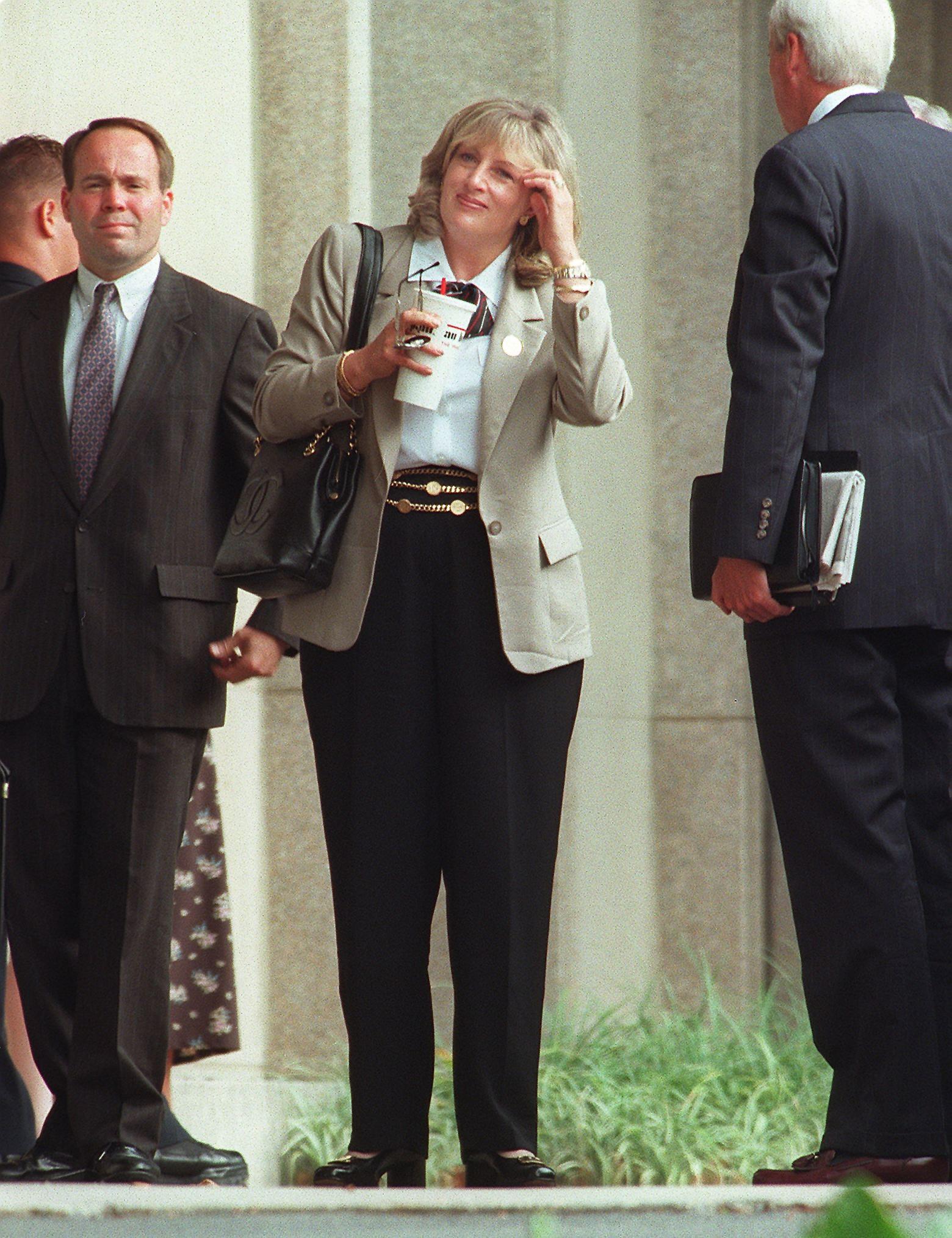
The following day, Tripp was wired by the FBI before she met with Lewinsky for lunch at Pentagon City Mall in Virginia. Investigators eventually took Lewinsky in, questioning her in a hotel room for hours trying to get her to flip on the president. She refused to wear a wire or turn on Clinton.
Starr later learned that Lewinsky possessed a dress that bore Clinton's DNA from one of their trysts. To Tripp, the blue dress served as Lewinsky's "insurance policy" as she said the taped phone calls were hers.
TRIPP: "Want you to think about this, and really think about it, instead of always just dissing what I say, OK?"
LEWINSKY: "I don’t always diss what you say." [UNCLEAR]
TRIPP: "Well, but you're very stubborn. You're very stubborn. The navy blue dress. Now, all I would say to you is. ... The future is a blank slate. I don’t know what will happen. I would rather you had that in your possession if you need it years from now. That’s all I’m gonna say."
TRIPP: "Put it in a baggie, put it in a Zip-Loc bag, and you pop it in with your treasures, for what I care. I mean whatever. Put ‘em on your little antiques."
LEWINSKY: "What for though?" [UNCLEAR]
TRIPP: "I don’t know, Monica. It's just this nagging, awful feeling I have in the back of my head. It could be your only insurance policy down the road. Or it could never be needed and you can throw it away. But I, I never, ever want to read about you going off the deep end because someone comes out and calls you a stalker or something and you have, and he confirms it. Something God forbid awful like that."
She turned the dress over to Starr’s team to get and keep her immunity, Lewinsky said. She’d considered washing the dress to destroy the evidence but she thought that would be obstruction of justice and she was in enough trouble.
In 1998, Starr brought Clinton in before a grand jury to answer questions. Clinton denied the relationship with Lewinsky during his testimony. Later that day, however, he gave a speech to the country, finally admitting to the relationship with Lewinsky.
"Indeed, I did have a relationship with Ms. Lewinsky that was not appropriate," Clinton said in his address to the nation. "In fact, I was wrong."
In December 1998, he was impeached by the House of Representatives on the grounds of perjury and obstruction of justice relating to his relationship with Lewinsky and other alleged actions. In February 1999, he was acquitted by the Senate and allowed to stay in office.
Clinton, who was the only U.S. president to testify as the subject of a grand jury investigation, also became the second U.S. president to be impeached.
Tripp, however, maintained that she had no regrets.
“Monica made her choices. She has had to live with those consequences as I have had to live with mine," Tripp said in 2001. "But, no. I would do it again, certainly."




